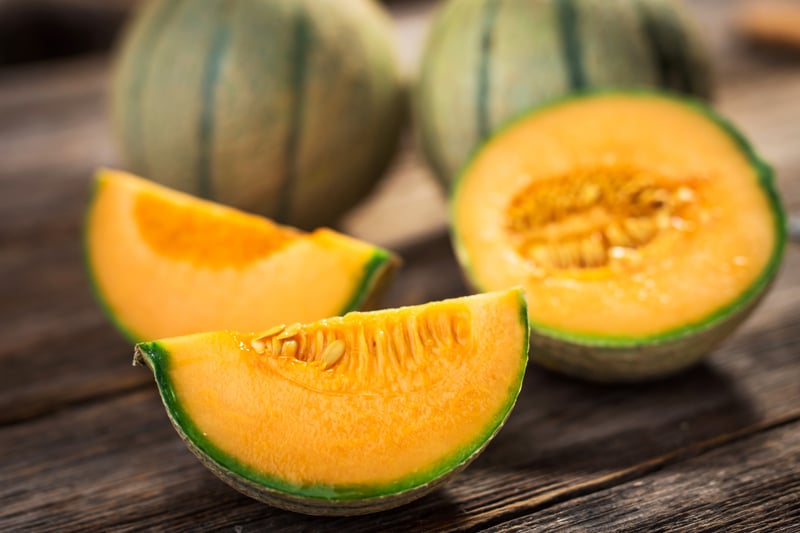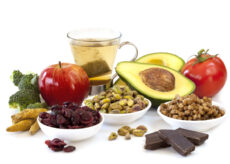16+ Best Foods for an Upset Stomach

An upset stomach can be due to overeating or drinking, too much stress, food poisoning, the nasty bug that’s going around work or school, motion sickness, etc. No matter what the cause, it’s never fun. It’s even worse if the issues are chronic. The cramping, farting, nausea, and heading for the bathroom every few hours (or minutes) are not only disruptive and uncomfortable, but they can be downright embarrassing or miserable. Depending on the reason, you may have no desire to eat at all. Or, you may be searching the cupboards or fridge for foods for an upset stomach to help settle your tummy troubles.
Tips for an Upset Stomach
We’ve probably all heard that bland foods that don’t contain strong flavors or odors are best when digestion is off or the stomach is upset. And most of us know that this is a time to avoid sugar, rich or fatty foods, and alcohol.
Other tips for an upset stomach include:
• Eating smaller snacks more often (every few hours) instead of big meals. Consuming too much food or drink in one setting will likely make your stomach feel worse. Nausea, though, can also increase when the stomach is completely empty. So, again, depending on why your stomach is upset, it can help if you avoid waiting too long between meals.
• Staying hydrated by sipping on water, decaffeinated teas, or some electrolytes. If you’re really fighting to keep food or drink down, you may want to suck on an electrolyte-enriched popsicle or even plain ice.
• Managing stress levels can help with virtually every issue, including an upset stomach. Especially if you have chronic medical issues like Crohn’s, irritable bowel syndrome (IBS), ulcerative colitis, celiac, or issues with your GI tract or microbiome, taking time out to relax and refresh may provide some much-needed relief.
• Especially for those with chronic issues or issues that tend to come and go, tracking changes can help you see if certain foods or environments are triggering your symptoms. You may have underlying food allergies or sensitivities, or you may find certain situations highly stressful, which can lead to or increase tummy woes.
• Avoiding foods that are high in insoluble fiber can help if you’re experiencing an upset stomach. This includes foods that contain wheat bran and whole grains as well as many fibrous vegetables. Instead, consume foods that are higher in soluble fiber, which may help ease diarrhea as well as constipation. Foods rich in this type of fiber include oat bran (or oatmeal), barley, nuts, seeds, beans, lentils, and peas.
• Avoiding foods that contain low-calorie sweeteners made with sugar alcohols, such as erythritol or xylitol, can also help.
• Looking at your medications can also help you determine if something’s off. For instance, a round of antibiotics can be a lifesaver when fighting off an infection. But, it can also kill off the good bacteria in the gut, which can upset the stomach and digestive system. Consuming probiotic-rich foods or supplements may help replenish the healthy flora to get the system back to running smoothly.
Foods for an Upset Stomach
There are also foods that are easier on your digestive system that may help heal your unhappy stomach and return your system to “regular.”
The BRAT diet was recommended for years to help relieve an upset stomach or diarrhea. This diet included:
1. Bananas
Bananas (the B in BRAT) are easy on the tummy. They contain water and fiber, which helps the digestive system move if you’re constipated, and they also provide nutrients that can be lost due to diarrhea, such as potassium. Plus, they provide carbohydrates to relieve fatigue. They’re also easy to prepare (just peel and eat), even when you’re not up for cooking.
There are a lot of great benefits for green bananas, including helping relieve diarrhea. You could also try making your own DIY banana soft-serve ice cream by blending up frozen banana with a dash of cinnamon or a scoop of collagen protein for an easy-to-eat and digest nutritious snack.
2. Rice
Rice is the R in BRAT. This food is also bland and helpful for those experiencing diarrhea. While many prefer the nutrient density of brown rice, white rice is a better food for an upset stomach as it can break down more quickly. Just leave off the flavorful additions, which may make your uncomfortable symptoms worse. You can, however, add in some bone broth or collagen powder as a little protein may help you recover.
3. Apples
Apples are the A in the BRAT diet. Apples are rich in pectin, a fiber, which is also easier to digest when stewed. Applesauce is also bland yet tasty enough to entice your tastebuds even when your stomach is upset. It’s also nutrient-rich with vitamins and antioxidants. Apples, though, may not be a good option for people with IBS, as the fermentable sugars may make symptoms worse.
4. Toast
Toast is the final letter in the BRAT diet. Again, toast is fairly benign and easy to digest. Choosing white bread toast may be even better as it’s lower in fiber, so it’s easier to break down and can help relieve nausea or heartburn. Remember, though, to avoid the usual creamy or sweet toast toppers (e.g., peanut butter and jam), which can defeat the purpose and lead to more discomfort. If you are sensitive to gluten, another possible substitute is plain white rice cakes.
While the BRAT diet was the go-to diet for upset stomach and diarrhea for generations, starting in the late 1990s, doctors and researchers found that it doesn’t provide many of the key nutrients needed to help the stomach recover. It’s low in fiber, calcium, protein, fat, and vitamin D, for instance. So, while these options fit into foods for an upset stomach, the overall diet shouldn’t be so restrictive. Plus, there are other nutritious foods that may help you feel better faster, including:
5. Apple Cider Vinegar
Apple Cider Vinegar, which provides enzymes and probiotics to help encourage the growth of healthy microflora in the gut. It may also help relax the intestines to help relieve bloating. Finally, due to its acidity, it may help promote nutrient absorption.
Low-sugar kombucha is another option that may be a little tastier yet still provides probiotics to help promote the growth of healthy bacteria in the gut.
6. Broth-Based Soups
Broth-Based Soups are a foundational food when recovering from virtually any ailment. They’re easy to digest and rich in vitamins, minerals, and other nutrients that the body needs to recover. They’re also high in water, which can help your body rehydrate, especially if you’ve been vomiting or had diarrhea.
7. Protein
Protein is an important nutrient to help the body recover and grow. Yet when the tummy is trembling, higher-fat foods like red meat can be difficult to get down and digest. Choosing lower-fat, easier-to-digest proteins like skinless chicken or fish with minimal seasonings may help soothe the stomach. How you cook the meats can also make a difference in how they affect digestion. Try broiled, roasted, or grilled over fried or sautéed.
Eggs are another high-protein food that tends to be easier to digest, especially when scrambled and consumed with dry white toast.
8. Crackers
Crackers may not be part of your typical healthy diet, but when you’ve been sick, you may have minimal appetite. And easily digestible foods are easier to keep down. Plain saltines made with white flour are good to nibble on sparingly to help ease your upset stomach.
9. Green Yogurt
Greek Yogurt has been found to be a soothing food for an upset stomach, as long as you don’t have any issues digesting dairy. It’s rich in probiotics but also provides healthy protein. Just avoid the versions that are loaded with sugars. Better yet, stir in a spoonful of flavored collagen powder or a spoonful of no-sugar-added applesauce (or both) for added flavor and benefits.
Of course, Greek yogurt isn’t the only good variety of yogurt. Other types of yogurt from unstrained traditional versions to Icelandic yogurt (aka skyr) to Australian and even alternative milk yogurts from goat to almond to cashew can all be beneficial as long as they contain live probiotics.
10. Easily-Digested Vegetables
Vegetables, especially those that are raw, can be harder to digest which can worsen your stomach issues. But the body still needs nutrients. Plain-boiled vegetables, such as green beans, carrots, tomatoes, celery, and spinach, can be easier on the system to keep you going until you recover. Plus, they can be added to broth-based soups for a more nutrient-packed yet mild small meal.
11. Probiotic-Rich Foods
Kefir is less well-known than yogurt, but it’s also rich in probiotics and can be consumed alone or mixed into smoothies to support a diverse microbiome. In research, it’s also been found to help support immunity and potentially help prevent infections. It may also tame tummy troubles as you recover. Just avoid those that have loads of added sugar, which can make an upset stomach worse.
Other probiotic-rich foods that may help promote a healthy microbiome include sauerkraut, miso, tempeh, and kimchi.
12. Stomach-Soothing Herbs
If your first thought is to sip on some ginger ale to help ease tummy troubles, it’s time to make an update. While there are benefits to ginger, for sure, ginger ale tends to be loaded with sugars, which can make the issues worse. And many store-bought options don’t even contain real ginger. So, if you want something to sip on, ginger tea, raw ginger, or even ginger supplements have been shown to be help reduce nausea and vomiting from morning sickness, motion sickness, and more as well as helping ease heartburn, stomach pain, and diarrhea.
Other stomach-soothing herbs or teas include chamomile (which may reduce nausea and gas), licorice (which may help with stomachaches), and mint (which may ease an unhappy stomach).
13. Papaya
Papaya contains a digestive enzyme (papain) that can help break down proteins, which can help smooth digestion and improve absorption. Some research suggests it helps reduce bloating and constipation and was used traditionally for stomach ulcers.
14. Potatoes
Mashed potatoes, white or sweet, made without butter or seasoning, are easier on the digestive system and are usually foods you can keep down, even if you’re feeling a bit nauseous. They also provide nutrients like potassium that can be depleted if you have stomach issues. Remember, though, to keep the serving small.
15. Pumpkin
Pumpkin is another high-fiber food that doesn’t irritate the digestive system, so it may help reduce stomach upset. It may be particularly helpful for slowing down the rate food passes through the body to reduce diarrhea.
16. Melons
Watermelon is exceptionally rich in water, so it can help hydrate the body while providing nutrients to help your body recover. All melons (e.g., cantaloupe and honeydew as well as watermelon) are also lower in fiber, which makes them easier to process. And if you want something that’s crisp and fresh rather than sweet, cucumbers are another great food for an upset stomach. When possible, though, choose ripe fruits and skip the seeds to ensure this food for stomach upset is as easy as possible to digest.
While spicy foods can make symptoms worse, there are some spices that have been found to help improve digestion and reduce bloating, including coriander, cardamom, turmeric, and fennel.
Foods for an Upset Stomach: A Wrap-Up
Upset stomach is often just a fact of life and can be due to myriad causes, both short and long-term. Some foods can make it worse. For instance, foods that aren’t recommended include:
- Citrus fruits
- Fried foods
- Spicy foods
- Raw fruits and vegetables, especially those that are fibrous, like cabbage, Brussels sprouts, cauliflower, and other cruciferous vegetables
- Sweets, including cookies, cakes, and pastries
- Alcohol
But there are also some foods for an upset stomach that can help get you back to normal faster. If, however, you experience acute symptoms regularly, including nausea, vomiting, diarrhea, heartburn, gas, or bloating, you may want to reach out to your personal healthcare practitioner to help get to the root cause and, ultimately, find the right solution for your upset stomach, which may include consuming a low-FODMAP diet.






 US Doctor: "Eating This Every Day Can Snap You Into Ketosis"
US Doctor: "Eating This Every Day Can Snap You Into Ketosis" 3 Key Nutrients to Help Lubricate Your "Tin Man" Joints
3 Key Nutrients to Help Lubricate Your "Tin Man" Joints AVOID Plant-Based Protein Powders (unless...)
AVOID Plant-Based Protein Powders (unless...)

